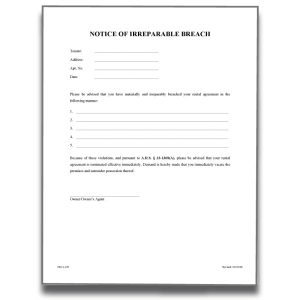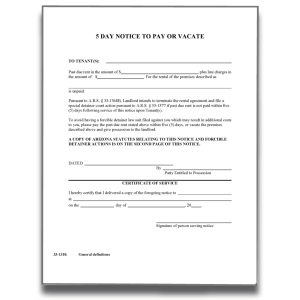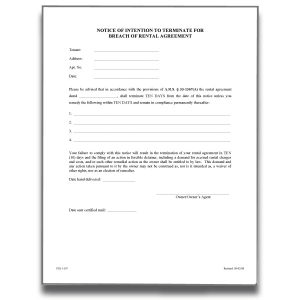Arizona Eviction Process
The following describes the process for evicting a tenant in Arizona known as a Forcible Entry and Detainer Action. This page applies to residential property (houses, apartments, etc.). It does not discuss evictions from commercial or agricultural property or from a mortgage foreclosure.
1. Notice to Quit is given to the tenant. Before a tenant can be evicted in Arizona, the landlord must give the tenant written notice of the reason to terminate the tenancy. In some instances, the notice may give the tenant time to correct the problem (or move out) in order to avoid eviction. Here’s a list of Arizona eviction notices which are explained in greater detail under the Notice to Quit heading:
- Arizona Immediate Notice to Quit – Irreparable Breach
- Arizona 5 Day Notice to Pay or Quit
- Arizona 10 Day Notice to Cure or Quit
The landlord must certify on the bottom of the original notice that a copy was delivered to the tenant in person or by certified mail. Unlike many other states, Arizona does not consider a Notice to Quit served simply by affixing it to the front door of the dwelling unit. If mailing a notice, a landlord must allow an additional 5 days for the tenant to act.
2. Wait for tenant to respond. Each type of an Arizona Notice to Quit has its own time frame along with the additional 5 days that’s required when serving a tenant by mail.
3. Lawsuit is filed. The landlord files a Forcible Entry and Detainer complaint and summons with the Justice Court if the tenant does not fix the problem or move by the deadline set in the Notice To Quit. In Arizona, a landlord generally needs 5 copies of the complaint and summons, one for the court, the landlord, two for the defendant and the other for a process server.
4. Tenant is given notice of the lawsuit. A process server will physically serve the tenant with a copy of the complaint and summons. The summons orders the tenant to:
a. appear at an eviction hearing, and
b. file a written answer to claims made in the complaint.
Note: If the lawsuit has been filed for not paying rent, the tenant can stop it and continue living in the residence by paying all rent past due, late fees, attorney’s fees and Court costs.
5. Schedule an Eviction Hearing. The court holds an eviction hearing after the case is filed in court and at least 2 days after the summons is served on the tenant. At this hearing, the judge will decide who gets possession of the property. If the tenant disputes the landlord’s claims, then the judge will set a date for trial to hear evidence from both parties.
7. File a writ of restitution. If the tenant does not dispute the landlord’s claims at the hearing or prevail at trial and the landlord receives a judgment for possession, the landlord must file a writ of restitution with the sheriff’s office to have the tenant warned they are trespassing if they do not vacate the property.
Notice to Quit
An Immediate Notice to Quit is used when a tenant engages in prostitution, criminal street gang activity, unlawful manufacturing of illicit drugs, and acts that are found to constitute a nuisance that threatens the health or safety of the landlord. A.R.S. § 33-1368(A)
A 5 Day Notice to Pay or Quit may be used when a tenant fails to pay rent within 5 days of the due date. So on day 6, a landlord may serve the tenant demanding they bring the rent current in full or move within 5 days. A.R.S. 33-1368(B)
A 10 Day Notice to Cure or Quit may be used by a landlord for a material noncompliance of tenancy or a material falsification made by the tenant on a rental application. The violation must be cured within 10 days or the tenant must vacate. A.R.S. 33-1368(A)
An example of a material falsification would include
- Number of occupants in the dwelling unit, income of prospective tenant, pets, current employment and social security number.
- Tenant’s criminal records, current criminal activity, and prior eviction record.


